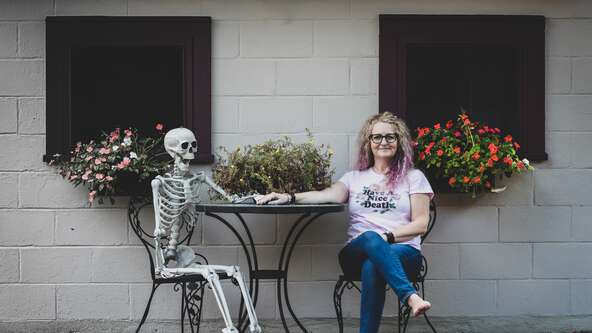Easier End-of-Life Conversations: Setting the Stage

Freelance entertainment producer Amy Pickard feels right at home interviewing celebrities on the red carpet, but when her mom died in 2012, she was completely overwhelmed by the job ahead, she tells Tulip Cremation.
A Million ‘Dumb’ Things
“From literally the moment that I found out that she had died, I had to become a detective and try to figure out, ‘Did mom have a will?’ When I put the key in the door, I thought, ‘I don’t even know who to contact to keep the lights on. I don’t know when she paid her last bill.’ It was just one tiny dumb thing, but then there were a million dumb things.”
When she died, Pickard’s mom was just 67 and lived alone in Chicago while her daughter was living in Los Angeles. “It was incredibly traumatizing, especially because we were so close. She was my best friend. We talked all the time,” she said.
‘It Made My Head Explode’
Pickard also found herself having to be a florist, a travel agent, and a party planner. “It made my head explode, and it made my grief infinitely, desperately more complicated. I was just shocked at how little I was prepared, and how little my mom was prepared,” she explained.
Talking with Parents Awkward, But Worth It
Talking with parents about their end-of-life plans can be awkward, but as Pickard’s experience reveals, knowing a few key things can help adult children more easily navigate the loss. She recommends that anyone broach the subject try this approach: “I always say that the best conversation opener is, ‘I’m organizing my stuff because I don’t want to put this horrible burden on you guys. I want to set you up for success if something happens to me. I realized if you don’t know what I want, I also don’t know what you want ... We need to talk about this. Let’s get a plan.’ It’s almost like a plan of emergency.”
Try a Hypothetical
Pickard also suggests that you discuss hypotheticals, such as what to do in a medical emergency or whether there are any people a parent or loved one is estranged from and does not want to see at the end of their life.
No ‘Right Way’ To Plan
There isn’t one right way to start these sometimes-awkward conversations. Still, experts say you can sit down for a planned discussion or sprinkle it in spontaneously, “when it feels natural,” like when you see a funeral depicted in a movie or on TV together. It can be a one-on-one conversation or held with several people. For people who don’t like surprises, it is good to give them a heads-up. Pickard and others also say the conversation should never start with money issues. These end-of-life planning advocates use their own stories to help demonstrate that even though these conversations might be uncomfortable, making arrangements without knowing someone’s wishes is even more uncomfortable.
Story Showed She Was ‘On to Something’
Pickard started sharing her personal story with friends and peers in their 40s and 50s. When she found that they listened and were making changes to their end-of-life plans, she knew she was “on to something.” “It was my personal story, the realness hit home with them,” she explained.
Conversations Sparked Planning Business
Those first conversations were the genesis of her end-of-life planning business. “I knew that I didn’t want anyone else to feel the weight that I was feeling,” she said. She began by creating a 50-page booklet to help pull together important information. But she knew the challenge would be getting people to fill it out. “If it is sitting in a drawer, it’s not going to help anybody,” she said.
So, she decided she needed to present her “Departure File” in a way that was “less serious, less formal, more fun, more accessible and more about the life you are leading now and how you want that expressed when you die.”
Wine and Cake Make Planning Fun
Pickard holds “super casual, super relaxed” “Good to Go!” parties where the conversations flow more easily with a glass of wine and a piece of cake. She says some have described her as the Death Tupperware Lady. Everyone brings a dish based on a recipe that celebrates a loved one, and Pickard plays music from a “death soundtrack.”
And while you might think a party about death would be depressing, she says, “Weirdly, it is really fun and funny. Nobody has left a party sad, depressed, or morbid. If anything, they skip out like Julie Andrews in the mountains.”
Pickard’s father died in 2016 and had been at one of her parties the year before, so she was able to navigate his death more easily than her mom’s. “He had written his own obituary, and he filled out his Departure File. His thoughtfulness transformed the death duties from a clueless nightmare to feeling like they were a continuation of him. I was honoring him by doing what he wanted.”
Additional Resources
You can find more information about planning for end-of-life on our website, including articles on How to Plan a Living Funeral, Prepaid Funeral Plans, and a Digital Estate Planning Guide.
If you’d like to explore prepaid direct cremation, we are here 24/7 to help.
Additional resources for end-of-life conversation starters include the National Alliance for Care at Home’s CaringInfo site, AARP, and The Conversation Project.
Photo credit: Bobby Tewksbury